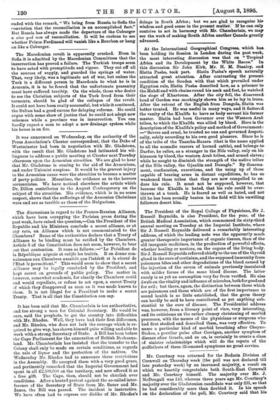The discussions in regard to the Franco-Russian Alliance, which have
been occupying the Parisian press during the past week, have raised the question,—Can the President of the Republic and his Ministers conclude a secret alliance, or at any rate, an Alliance which is not communicated to the Chambers P Some of the authorities declare that a Treaty of Alliance to be binding must be ratified by the Chambers. A.rticle 8 of the Constitution does not seem, however, to bear out that contention. It runs as follows :—" Le President de La Republique negocie et rat ifie les traites. Ii en donne con- naissance aux Chambres aussitot que l'interet et in siirete de rEtat le permettent." This would seem to show that a secret Alliance may be legally concluded by the President, and kept secret on grounds of public policy. The matter is, however, somewhat academic, for clearly the Chambers could and would repudiate, or refuse to act upon, a secret Treaty of which they disapproved as soon as it was made known to them. It is not illegal for a President to make a secret Treaty. That is all that the Constitution can say.


































 Previous page
Previous page